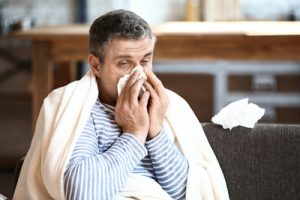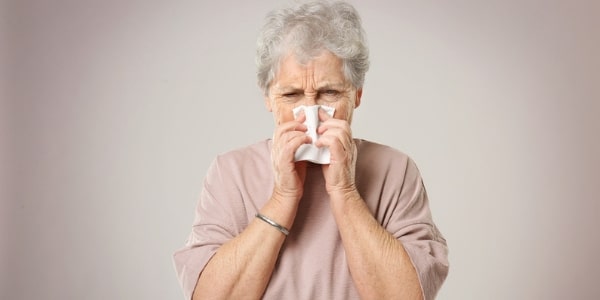The process of aging involves many changes to our bodies. We may experience a slower metabolism, pain in our joints or memory loss. Our immune system weakens with age, which is known as immunosenescence. As a result of these changes to our immune system, allergy conditions develop related to food, skin, drugs, and nose. Medications, along with lifestyle adjustments, can bring temporary relief to older adults. A weakened immune system is part of the aging process, but it does not have to be the reason for someone’s quality of life to suffer.
Food Allergy
An allergic response to certain foods may be caused by a decrease in stomach acid, which hinders protein digestion. A lack of vital nutrients, specifically vitamin D, zinc, and iron, may also alter our immune system’s ability to function properly. More than 14 units of alcohol, which is defined differently for various types of alcoholic beverages, can also be a factor in testing positive for food allergies. Once a food trigger is identified, there are ways to avoid the consumption of these irritants.
The most recommended and effective way to stop a food allergy is to eliminate it from your daily diet. This approach may seem simple, but it is not always easy to implement. Practical ways to avoid food allergies are reading all food labels, modifying recipes, asking questions, avoiding cross-contaminations, and providing your own food at social functions. Inedible ingredients that are absorbed into the body are other sources of allergies that lead to skin disorders.
Skin Allergy
There are several skin disorders that are related to a weakened immune system. In elderly patients, a doctor will see atopic dermatitis, psoriasis and eczema. Within these disorders is xerosis, which is dry skin. Hypothyroidism, a common autoimmune disease, affects the skin and causes severe itching and overall discomfort. There are no cures for these autoimmune skin diseases, but temporary relief can be found with certain over-the-counter products.
Severe itching, which is the most dominant symptom, should be treated with moisturizers that will prevent the constant urge to scratch the irritated skin. Products that contain alcohol should not be used because alcohol dries out the skin. Internally, antihistamines can help someone get relief from itching, and the ones that cause drowsiness can give someone restful sleep. There are other medications that can be taken, but a doctor should be seen to prescribe them and evaluate other medical conditions that a patient may have.
Drug Allergy

First-generation antihistamines may cause anxiety, blurred vision and constipation, so it is best to take second and third-generation antihistamines because they have fewer harmful side effects. A physician or pharmacist can help a patient identify antihistamines that are first, second and third generations. NSAIDS should also be taken with caution and substituted with other pain relievers. With aging comes another concern about allergies in the form of nasal changes and diseases.
Nasal Allergy
Immunosenescence plays a part in rhinitis, which is inflammation of the mucous membrane in the nose. Allergens such as pollen and dander are the biggest triggers for rhinitis in the elderly. Although rhinitis is not life-threatening, it is a condition that leads to sleep deprivation and in some cases, depression. The most recommended way to treat allergic rhinitis is to limit or eliminate exposure to environmental triggers.
Mild allergic rhinitis in elderly patients, can be safely treated with second-generation antihistamines. When the rhinitis reaches a more moderate or severe level, intranasal corticosteroids are a healthcare provider’s best method of treatment. As with most prescribed medications, there are side effects with intranasal corticosteroids as they can cause nasal dryness and mucosal crusting.





